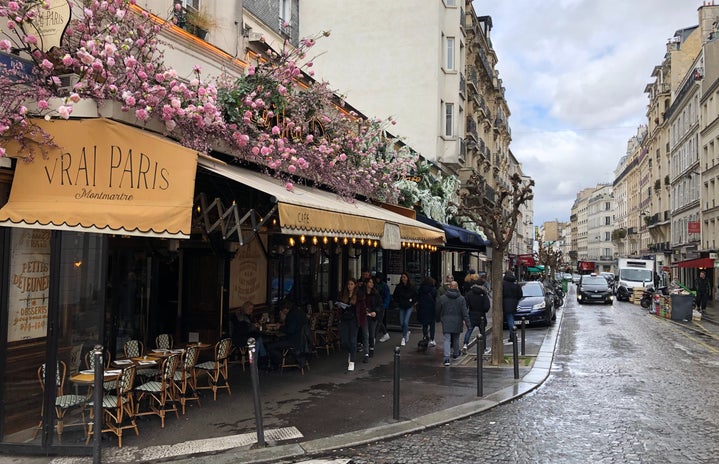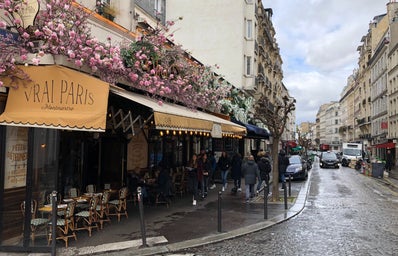French is regarded as the language of love, yet it receives little of that love from those looking to learn a second language. Though it has been a delight of mine to learn over the past seven years, I more often than not find others surprised by my affection for French. The range and beauty it possesses are unrecognized by many, leaving only a bitter taste in their mouths as they fail to form the guttural ‘r’ of arrêt.
Finesse of the foreign can be fickle, but it’s worth looking beyond one’s own possible ignorance to be open to a new world of knowledge. The language has unlocked so many joys for me, both large and small, that I would be remiss to not pass on the unexpected uses of this language, and pass on some of the great cultural works one can enjoy by learning French.
- It’s useful for classes
-
Academics has surprised me the most, as I’m sure it is a surprise to you too. While Greek or Latin may be scattered about in prefixes and suffixes, French has entered the lexicon of all varieties of study. Art history, for example, has the Impressionist movement, which draws their terms from the many French creators’ terms, like how Claude Monet painted “en plein air” (outside). More interested in performing than observing? Theatre will teach the importance of the “mise en scene” (staging, composition) of a play, and when playing music remember to play your instrument “doucement” (sweetly) when setting the mood. While the arts’ historic connection to French isn’t everyone’s cup of tea, the humanities and STEM subjects aren’t to be forgotten. English even casts aside our own word of “resolution’ for the denouement of a narrative, and the medical field is vigilant to look out for a torsade de points (“twisting of the points”) in a patient’s heart rhythm.
- You get to appreciate French culture more
-
Stepping out of the scholarly bubble, the culture that Francophone creators have made can be enjoyed at the hobby level as well. French writers are famous around the world, like Victor Hugo and Les Miserables or Albert Camus and L’etranger (The Stranger), as well as some who’ve yet to reach an anglophone audience. Guadalupian writer Maryse Conde’s Moi, Tituba, Sorcière…Noire de Salem (I, Tituba, Black Witch of Salem) reworks The Crucible and tells the story from Tituba’s point of view. She also has written Tales From the Heart: True Stories From My Childhood, a wonderfully written autobiography that highlights Guadalupe. Any of these works can be read through translation, but reading a text in the author’s native language— when you can understand them—allows you to see their heart. Not a bookworm? Try your hand at French film, home to the Cannes Film Festival. Subtitles are great to use, but coming-of-age stories like Migonnes (Cuties), and LGBTQ films such as La vie d’Adèle (Blue is the Warmest Color) and Portrait de la jeune fille en feu (Portrait of a Lady on Fire) are available on Netflix and Hulu to stream.
- You can have a better understanding of French food
-
The experience of food is a universal one, but let your palette be enriched by truly understanding those French terms of cooking and baking. If The Great British Bake Off has taught me anything, it’s that it’s a lot easier to figure out what a choux pastry is supposed to look like if you know the leafy and round translation of the word (cabbage). Along with pastries, you may have come across instructions like “dégorgé” (poured, bled, discharged) and “sauté” (form of ‘to jump’). A little knowledge can go a long way, as instructions to sauté will make the vegetables “jump,” while likewise instructions to dégorgé involve removing, or “bleeding” the juices from an ingredient.
Even in an English-speaking world, as other languages blend with our own it’s worth getting to know them. Getting into uncharted territory of language can be intimidating, but by doing so one can engage in richer experiences in our lives. Though French may be the language of romance, it has opened my heart to fascinating knowledge and has allowed me to understand a bit more in a vast world.
If nothing yet so far has piqued your interest, consider French as more of a conversation starter with Timothée Chalamet for your serendipitous meeting on the streets of New York.
Want to keep up with HCBU? Make sure to like us on Facebook, follow us on Instagram, check out our Pinterest board, and read our latest Tweets!


